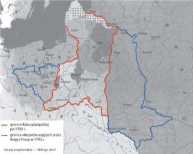3071579757
Zofia Zielińska
The Partitions of Poland

antyrosyjską demonstrację wojenną na Bałkanach. Miała ona przekonać Katarzynę 11 o determinacji cesarza w niedopuszczeniu do usadowienia się tam Rosji. I właśnie ten konflikt między mocarstwami stanowi najważniejszą przesłankę rozbioru - Fryderyk II bowiem w propozycji podzielenia się Polską, do której nakłaniał Katarzynę II, upatrywał najlepszy sposób zarówno realizacji własnych dążeń, jak i zaspokojenia aspiracji zdobywczych Rosji i wygaszenia jej konfliktu z Austrią.
Jednakowoż to nie Prusy, a Rosja była mocarstwem, które decydowało, czy do rozbioru dojdzie. I trzeba wyraźnie powiedzieć, że nie znamy pewnej, to znaczy popartej wiarygodnymi źródłami odpowiedzi na pytanie, dlaczego i kiedy w Petersburgu zapadła decyzja o podziale, dlaczego Rosja przystała na odrzucane wcześniej pruskie propozycje. O ile bowiem Austria i Prusy otworzyły swe archiwa, i historycy, zwłaszcza Adolf Beer, Albert Sorel i Gustav Bertold Volz wyczerpująco przedstawili poczynania władców tych państw, zmierzające do rozbioru, o tyle dostęp do archiwaliów rosyjskich wciąż jest na tyle trudny, że sprawa nie została wyświetlona. Rosyjska historiografia nadal powtarza tezę, lansowaną już przez propagandę Katarzyny II, iż Rosja rozbioru nie chciała, ale została doń zmuszona wskutek nacisku Prus i wrogości Austrii. Teza ta nie wytrzymuje krytyki. Równie niewiarygodne jest uzasadnienie rozbioru zawarte w podziałowych traktatach prusko- i austro-rosyjskich. Jako przyczynę konieczności rozwiązania rozbiorowego podano tam zagrożenie europejskiego pokoju przez „polską anarchię”, czyli konfederację barską. Z punktu widzenia Petersburga za barską irredentę Polska powinna zostać ukarana, ale przecież karą tą nie musiał być rozbiór. Zresztą and Russo-Austrian treaties is eąually unconvincing and ques-tionable; the threat to European peace posed by the "Polish an-archy”, i.e. the Bar Confederacy, is there given as the reason for the unavoidable need to implement the partition solution. From the Russian point ofview, Poland should have been punished for harbouring this seditious confederacy; but not necessarily by having its territory parririoncd! Moreover, at the point when the partition was being decided on, no-one in St. Petersburg could have doubted that the dcfeat of the Bar confederares was only
In supporting the thesis that Russia was forced to conduct the partition against its will, Russian historians have failed to consider an important factor, i.e. the Russian desire to annex the Commonwealth lands. With regard to Polish Ukrainę, these desircs are evident in source materiał dating from as early as the 1740s, and then again in documenrs from the period of the Seven-Year War (beginning in 1759, when St Petersburg formu-lated to its allies the terms of the futurę peace). Then, on the eve of the death of King Augustus III of Poland, those territorial demands reappeared in a new form. Zachar Chernyshev, the chief of the Military College, presented to Catherine his plan of the annexarion of precisely the same territory that Russia would later gain during the First Partition. It was a projcct for a one-sided Russian annexation, given the opportunity by the chaos of the interregnum; it did not contain any indication of sharing the Commonwealth with its other neighbouring superpowers. In the yeais 1763-1764 Catherine II did not implement Cherny-shev’s plan, probably due to her fcar of losing Prussia’s goodwill and also to the quick and successful ending of the interregnum in Poland. But the plan was not forgotten; this much is evident from the events of 1767, which constituted a step towards its fulfilment. In that year, new Russian troops, which entered Poland in connection with the issue of rights for non-Catholics, conducted a thorough and detailed survey of property, demo-graphics, administration and denominations precisely on the lands mentioned in Chernyshev’s project. Again, it is not known why annexation was not carried rhrough this time either; it can be assumed that Catherine II, still loarh to share the potenrial newly-acquired territory with Austria or Prussia, did not wish to offend the latter especially by unilaterally annexing the Polish lands. Against the background of the above-mentioned on-going drive towards annexation, represented by the influential Cherny-shev family faction, it is an important fact that Catherine II was accompanied by nonę other than General Chernyshev himself when on 8lh January 1771 she revealed to the yisiting Prince
Wyszukiwarka
Podobne podstrony:
KWARTALNIKPOLONICUM Zofia ZielińskaThe Partitions of Poland MarccUa Bacciarcllcgó (*1793). Olej na
KWARTALNIKPOLONICUM Zofia ZielińskaThe Partitions of Poland mieli spokrewnieni z wieloma domami
Rozbiory Polski Dorpat Q l^yneburg Troki,- To] °Matbork Lidzbarl Drahim Mińskę The Partitions of Pol
Rozbiór III Dorpat Q l^yneburg Troki,- To] °Matbork Lidzbarl Drahim Mińskę The Partitions of Poland
Rozbiory Polski Dorpat Q l^yneburg Troki,- To] °Matbork Lidzbarl Drahim Mińskę The Partitions of Pol
Rozbiory Polski Dorpat Q l^yneburg Troki,- To] °Matbork Lidzbarl Drahim Mińskę The Partitions of Pol
KWARTALNIKPOLONICUM Zofia ZielińskaRozbiory Polski Wykład o genezie rozbiorów Rzeczypospolitej
KWARTALNIKPOLONICUM Zofia ZielińskaRozbiory Polski szeń w Rzeczypospolitej, w stosunku do Rosji
KWARTALNIKPOLONICUM Zofia ZielińskaRozbiory Polski w tym także swego ambasadora Nikołaja Repnina, kt
KWARTALNIKPOLONICUM Zofia ZielińskaRozbiory Polski wtedy, gdy o nim decydowano, nikt w Petersburgu n
str 040 041 ległoś ci w granicach przedrozbiorowych. Tymczasem była to w gruncie rzeczy gigantyczna
II rozbiór RP KfccrkJIIIL %P%kov Tv#co > SkKks *twg f / Zytom*f7Republic of Poland After Second P
ZOFIA KACZOROWSKA PRECIPITATION IN POLAND IN LONG-PERIOD AVERAGES Summary In the first part of this
Wojciech Kaute Michał llohrzynskPs synlhcsis of Ihc bisiory of Poland Sumniary M. Dobrzyński *s synl
potwierdzenie zgodności obiektu portowego I RZECZPOSPOLITA POLSKA REPUBLIC OF POLAND
CONTENTS L. Starkel: Progress in research on the evolution of the geographical environment of Poland
41671 potwierdzenie zgodności obiektu portowego I RZECZPOSPOLITA POLSKA REPUBLIC OF POLAND
więcej podobnych podstron